View all filters
Clear
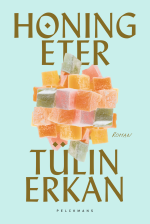
ARRIVALS / GELIȘ (Honingeter)
Sibel wacht in de luchthaven van Istanboel. Elke dag opnieuw mist ze haar vlucht naar Brussel. Ze voelt zich in de beide landen niet thuis, wil grip krijgen op de herinneringen aan haar overleden vader en haar taal herontdekken. Sibel vult de dagen met het observeren van andere passagiers en de zorg voor een speurhond.
Maar zelf wordt ze ook geobserveerd. Bewakingsagent Ömer houdt haar via zijn schermen in da gaten en beslist haar te beschermen, zoals een vader. En dan is er nog Wernicke, een piloot die niet alleen zijn job verloor, maar nu ook zijn taal en gezondheid. Alle drie leven ze illegaal in de luchthaven, met hun eigen bagage en communicatieproblemen. Een sneeuwstorm verlengt hun ongemakkelijke samenzijn, maar een afscheid is onafwendbaar.
Erkan omschrijft gevoelig hoe het is om tussen twee culturen op te groeien. Honingeter maakt bevattelijk hoe onmogelijk het is de ander echt te begrijpen en om je ergens thuis te voelen als je je moedertaal niet kunt spreken. Met poëtische metaforen toont Erkan de kwetsbaarheid van haar personages.
Tülin Erkan (1988) groeide op in Oostende bij een Franstalige moeder en een Engelstalige grootmoeder. Haar zomers bracht ze door bij haar vader in Turkije. Wanneer mensen haar als half omschrijven, voelt ze zich vooral dubbel. In haar debuut Honingeter rijgt ze taal en herinnering virtuoos aan elkaar tot een gecondenseerd geheel.
Written in Dutch by Tülin Erkan
7 minutes read
Susret
Translated from
Romanian
to
Serbian
by Simona Popov
Written in Romanian by Alexandru Potcoavă
8 minutes read

17, 18
Translated from
Serbian
to
Slovenian
by Natalija Milovanović
Written in Serbian by Marija Pavlović
8 minutes read
Spotkanie po latach
Translated from
Romanian
to
Polish
by Olga Bartosiewicz-Nikolaev
Written in Romanian by Alexandru Potcoavă
8 minutes read

24
Translated from
Serbian
to
Spanish
by Ivana Palibrk
Written in Serbian by Marija Pavlović
10 minutes read
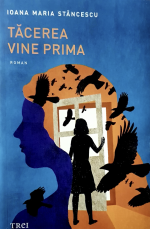
Tăcerea vine prima (Silence comes first)
Tăcerea vine prima vorbeşte despre trauma unei familii contemporane şi despre blocajele de comunicare dintre mai multe generații de femei. Atunci când tăcerea se instalează într-o familie, toate comportamentele sunt creatoare de traume. Singura soluție pare să fie depășirea fricii și deschiderea rănilor.
Subiectul principal îl reprezintă relația complicată a Dorei, pe de o parte cu mama sa intruzivă și veșnic nemulțumită, pe de altă parte cu fiica adolescentă care începe să-și ceară dreptul la independență. Crescută într-o familie în care femeile și bărbații au fost dintotdeauna într-un raport de forță, copiii au acoperit goluri și dureri, fericirea personală n-a părut necesară, mamele au îmbătrânit urât, iar tații, în tăcere, Dora preferă fantasma realității. Într-un moment de curaj, ea intră într-o relație online cu Toma. Totuși, chiar și după ce ajunge la Braşov, acolo unde locuieşte bărbatul, spaima de a nu fi dezamăgită o face să se întoarcă acasă, fără ca întâlnirea să aibă loc. Când însă, Toma vine în București și o sună, Dora este nevoită să ia o decizie. Nu înainte de a rupe tăcerea şi a da cărţile pe faţă, într-o discuţie cu mama ei.
“Silence Comes First" explores the trauma within a contemporary family and the communication barriers between multiple generations of women. When silence takes root in a family, every behavior becomes a source of trauma. The only solution seems to be overcoming fear and confronting old wounds.
The central theme is on one hand Dora's complicated relationship with her intrusive and perpetually dissatisfied mother, and on the other the dynamic with her teenage daughter, who is beginning to assert her right to independence. Raised in a family where women and men were always engaged in a power struggle, where children filled voids and covered up pain, Dora searches for an escape. After a childhood where personal happiness seemed unnecessary, where mothers aged poorly, and fathers remained silent, Dora prefers the fantasy over reality. In a moment of courage, she enters an online relationship with Toma. However, even after she travels to Brașov, where Toma lives, her fear of disappointment drives her to return home without meeting him. But when Toma comes to Bucharest and calls her, Dora is forced to make a decision. However, she can only do that after breaking the silence and laying all the cards on the table in a conversation with her mother.
Written in Romanian by Ioana Maria Stăncescu
9 minutes read
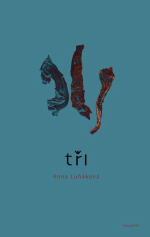
Три!
Translated from
Czech
to
Ukranian
by Olha-Anastasiia Futoran
Written in Czech by Anna Luňáková
7 minutes read
Aleea Zorilor: începutul
Written in Romanian by Andrei Crăciun
8 minutes read

Tři!
Experimentální román Tři! rozvíjí zkušenost terapeutického sezení, ve kterém se autobiografické motivy prolínají s jazykovou hrou, a do kterého úmyslně vstupuje ta, která se vyprávěním snaží znovu vynalézt sebe sama. Komentáře terapeuta motivují cestu tohoto pátrání po identitě, vedoucího stále hlouběji, až na hranici disociace. Muž a žena v jedné osobě, ale i muž a žena vedle sebe, usilují o splynutí, a vedou tak otevřenou polemiku s autenticitou, rodem i narací.
„Možná to bylo v babiččině spíži, když jsem si prohlížela sklenici s kečupem, na kterém bylo na bílém podkladě napsáno modře: jemný. Možná to byla jen ta schopnost všímat si detailů.“
Vzpomínky odhalované ve snaze pojmenovat jedno dospívání odráží i prostou zkušenost sídliště, chudoby, ale i dětství v druhé polovině devadesátých let na malém městě, či následný přechod do Prahy na studium filosofie, která je vším jiným než konejšivou utěšitelkou.
„Kdo ztrácí kontakt s hmotou, přijde nakonec o všechno.“
Written in Czech by Anna Luňáková
6 minutes read
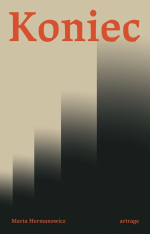
Konec
Translated from
Polish
to
Czech
by Agnieszka Buchtová
Written in Polish by Marta Hermanowicz
11 minutes read

Najpierw przychodzi milczeni
Translated from
Romanian
to
Polish
by Aleksander Podgórny
Written in Romanian by Ioana Maria Stăncescu
8 minutes read
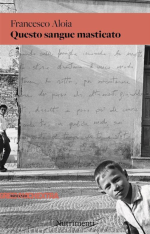
Тази дъвкана кръв
Translated from
Italian
to
Bulgarian
by Brigitte Mancuso
Written in Italian by Francesco Aloia
9 minutes read
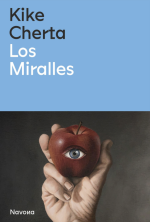
Strážných
Translated from
Spanish
to
Czech
by Markéta Cubrová
Written in Spanish by Kike Cherta
7 minutes read

Meine Mutter hat Blumen gezüchtet
Translated from
Serbian
to
Ukranian
by Maksimu Andre Martynenko Shchehlov
Written in Serbian by Ljiljana D. Ćuk
5 minutes read
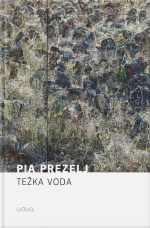
Важка вода
Translated from
Slovenian
to
Ukranian
by Yuliia Stankevych
Written in Slovenian by Pia Prezelj
8 minutes read

Diário da Vida
Translated from
Serbian
to
Portugese
by Ilija Stevanovski
Written in Serbian by Marija Pavlović
10 minutes read
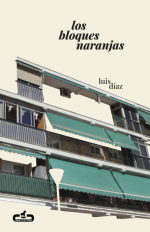
Blocurile portocalii
Translated from
Spanish
to
Romanian
by Ilinca Gângă
Written in Spanish by Luis Díaz
8 minutes read
Cathedra sau cum se face frișca
Translated from
Dutch
to
Romanian
by Cătălina Oșlobanu
Written in Dutch by Joost Oomen
9 minutes read
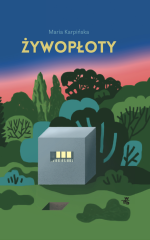
Los setos
Translated from
Polish
to
Spanish
by Teresa Benítez
Written in Polish by Maria Karpińska
12 minutes read

Teška voda
Translated from
Slovenian
to
Serbian
by Jelena Ivanišević
Written in Slovenian by Pia Prezelj
9 minutes read